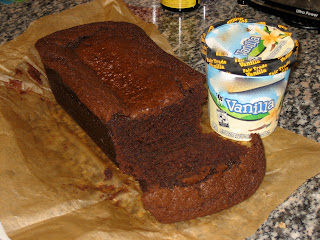This is the
Anniversary Cake I posted photos of before. It is a chocolate genoise cake, a traditional French sponge cake, imbibed with Frangelico, a hazelnut liquor, covered in a chocolate ganache, and topped with marzipan roses.
A genoise is nothing, I repeat NOTHING, like an American sponge cake. It is actually quite dry and, when made properly, light. I mention made properly, because I had some trouble in that area. Genoise is not an easy cake to make (or at least not the easiest) and this was my first attempt. Everything went well at the beginning. I was able to use the bowl of my new Kitchen Aid (thank you mom!) over a pot of boiling water to heat the eggs then transfer them to the mixer. They fluffed up just as they were supposed to. My problem came as I folded in the dry ingredients. I forgot to turn the bowl periodically, so when I went to pour out my nice light batter, I found a large pocket of unblended dry ingredients. To mix them in after starting to pour the batter, I had to deflate it significantly. This meant that my cake was a little too dense, didn't rise as much in the middle as it should have, and had large 'tunnels' in addition to the small delicate air bubbles that it was supposed to have. It still tasted excellent and I didn't really want to make another cake, so I used it.
As I said above, I imbibed it with Frangelico. I used it because I thought the hazelnutty vanilla taste would be a nice compliment to the chocolate cake, not to mention the marzipan roses. I was right, if I do say so myself. And like my cookbook said, the dry genoise sucked it right up.
I coated the cake with a layer of ganache (basically heavy cream and melted chocolate). The trick to getting a nice even, thick layer is to freeze the cake for 30 min before you pour the ganache on it, that way the ganache hardens quickly, thus it doesn't pour off the sides too much. To get a even and bubble free layer, it is important to mix the ganache as little as possible before you pour it on the cake. The more you mix, the more air bubbles get trapped, which will pop on your cake when you spread on the ganache.
Finally I made the marzipan roses. These were easier than I expected, though they were still hard. The trick is to work with it between 2 layers of plastic wrap. That way it doesn't stick to anything, and you can make it as thin as it can be. Anyway, I'm not going to give a blow by blow description of making a marzipan rose. If you want to know, post a comment telling me so, and I'll post the instructions. Basically, I made a cone of marzipan to attach each carefully hand made petal to. I flattened one edge of the petal more than the others to make it realistic but still stable. Each successive row of petals had to be slightly larger than the one before it, to make the rose look like it was blossoming. I made one open blooming rose, one slightly open bud, and one closed bud, which I arraigned on the cake.
It took many hours to make all this and so little time to eat. If it wasn't so delicious, it would almost be sad to eat it.










